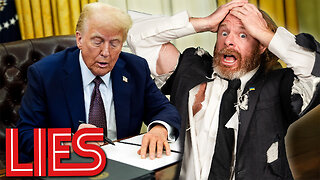Premium Only Content

Episode 2446: Trust in God, Not in Worry - Morning Episode
In this episode, we will explore the struggle between trusting in God versus relying on our own sense of control, a topic that is ever-relevant in our modern world. We’ll reflect on the words of St. Bonaventure, the insights of Catholic authors Carrie Gress and Noelle Mering, and a crucial passage from the Gospel of Matthew that challenges us to put our trust in God rather than in material wealth. Let’s begin by anchoring ourselves in the reality that God is present in every aspect of our lives, even when we are blind to it.
St. Bonaventure, the great Franciscan theologian and mystic, once wrote, “In everything, whether it is a thing sensed or a thing known, God Himself is hidden within.” This profound statement reminds us that God permeates all aspects of creation. Whether we perceive Him or not, He is there, intimately involved in every detail of our lives. This truth should give us immense peace, for it means that God is not distant but present in both our joys and struggles.
Yet, how often do we allow ourselves to fall into the trap of worrying, believing that through our anxiety and overthinking, we can somehow control the future? Carrie Gress and Noelle Mering, in their insightful book Theology of Home, address this very human tendency. They write:
“Worrying appeals to us because it gives us a sense that we are in control of what might happen–that by thinking through what could happen, we could somehow stave off potential harm or damage. There can be advantages to thinking problems through and trying to prepare ourselves for whatever may come, but we can often take it to an extreme, leading to decision-making based on fear and anxiety rather than balance and trust.”
This resonates deeply with the traditional Catholic understanding of Divine Providence. Worrying, at its core, can be seen as a lack of trust in God. When we obsess over potential outcomes, we subtly begin to place more faith in our ability to manage circumstances than in God's providential care. Our thoughts and decisions become rooted in fear, rather than in a peaceful trust that God will provide for us, as He always has throughout history.
The Gospel offers us a powerful antidote to this mindset. In Matthew 19:23-26, our Lord confronts the disciples with a challenging truth about the dangers of wealth and self-reliance:
“Then Jesus said to his disciples, 'Amen, I say to you, it will be hard for one who is rich to enter the kingdom of heaven. Again I say to you, it is easier for a camel to pass through the eye of a needle than for one who is rich to enter the kingdom of God.' When the disciples heard this, they were greatly astonished and said, 'Who then can be saved?' Jesus looked at them and said, 'For human beings this is impossible, but for God all things are possible.'”
Here, Christ emphasizes the futility of relying on earthly riches, which can create a false sense of security and control. Wealth, like worry, can deceive us into thinking that we are self-sufficient, that through our resources, we can navigate any difficulty. But Christ reminds us that salvation, like every good thing, comes not from our efforts but from the grace of God. “For human beings this is impossible, but for God all things are possible.” This is the key to breaking free from the cycle of worry and control: acknowledging that we are not in control and that it is God alone who can bring about what is truly good for us.
This lesson is especially relevant in today’s world, where many are tempted to place their trust in financial stability, technology, or human institutions, all of which can fail. True security comes only from God, who desires to lead us to eternal life. The Church, in her traditional wisdom, has always taught the importance of detachment from material things and the need for trust in Divine Providence. The lives of the saints give witness to this truth, as they abandoned themselves to God’s will and found peace, even amidst suffering.
Conclusion:
As we conclude, let us remember the words of St. Bonaventure, who reminds us that God is hidden in everything. When we encounter difficulties, instead of turning to worry and a false sense of control, let us turn to prayer, entrusting our lives to God’s providence. We are not called to figure everything out on our own; we are called to trust that God is working all things for our good, even when we do not see it. Like the disciples in the Gospel, we may be tempted to ask, “Who then can be saved?” But let us take comfort in Christ’s words: “For God, all things are possible.”
-
 1:00:03
1:00:03
Candace Show Podcast
4 hours agoWOAH! Daily Wire CEO Shares HARSH Feelings About Brett Cooper | Candace Ep 138
89.1K126 -
 LIVE
LIVE
Dr Disrespect
7 hours ago🔴LIVE - DR DISRESPECT - TRIPLE THREAT CHALLENGE - NOBODY STOPS US
3,083 watching -
 1:54:45
1:54:45
Twins Pod
5 hours agoMAGA P***star is HATED By Conservatives AND Leftists... | Twins Pod - Episode 49 - Brandi Love
41.1K43 -
 15:45
15:45
inspirePlay
1 hour agoLong Drive Showdown: Martin Borgmeier vs. 3 of the World’s Longest Female Golfers at 8,000+ Yards!
6953 -
 1:01:19
1:01:19
PMG
20 hours agoWere the California Fires Intentional & Shocker - the Vax May Cause Long COVID
3.81K2 -
 39:53
39:53
Bare Knuckle Fighting Championship
1 day agoBKFC KNUCKLEMANIA V PHILADELPHIA Weigh-In | LIVE!
8.23K2 -
 DVR
DVR
Scammer Payback
3 hours agoCalling Scammers Live
35.5K4 -
 1:10:38
1:10:38
Awaken With JP
5 hours agoJFK Files to be Released! Trump’s Boss Move - LIES Ep 75
67.2K42 -
 1:50:19
1:50:19
The Quartering
6 hours agoTrump NUKES The Deepstate, BANS Trans In Military & Terminates Dr. Fauci Protections!
105K64 -
 58:24
58:24
Uncommon Sense In Current Times
21 hours ago $0.28 earnedUnbreakable: How Jeff Younger Stands Firm Against Courts, Government, and Personal Attacks
24.6K1